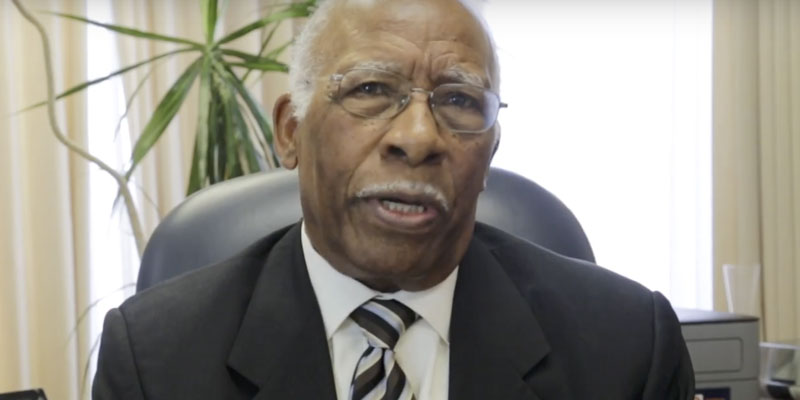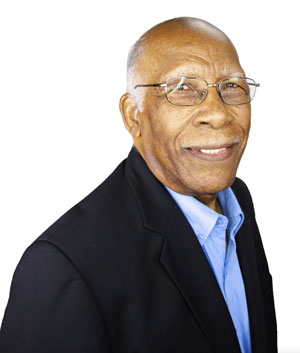
Do you eat black-eyed peas on New Year’s Day?
Podcast: Embed
Subscribe: RSS

Podcast: Embed
Subscribe: RSS
Podcast: Embed
Subscribe: RSS


Dr. Melvin E. Banks, Sr.
UMI (Urban Ministries, Inc.) announced today that its founder Dr. Melvin E. Banks, Sr., died on Saturday, February 13, at 86. Dr. Banks launched UMI in 1970 to provide African American churches and individuals with images reflecting their congregations and relatable, Christ-centered content from an urban perspective.
“Dr. Banks was a revolutionary publisher and giant for the African American church and community,” said C. Jeffrey Wright, CEO of UMI. “He was the first to create contextualized content that portrayed positive images of African Americans in the Bible. Because of his innovation, UMI has reached millions of Black churches and individuals with the Gospel.”
For the last 50 years, under Dr. Banks’ leadership, UMI has developed Christian education resources, including Bible studies, Sunday School, and Vacation Bible School curriculum, websites, magazines, books, and videos for its 40,000+ strong customer base. He wrote a number of books and devotionals and hosted a two-minute daily podcast called Daily Direction. In 1995, he brought on Mr. Wright as CEO to take on the day-to-day management of the company. Many evangelical organizations have recognized his pioneering work, including the Evangelical Christian Publishers Association (ECPA), which presented him with its inaugural Kenneth N. Taylor Lifetime Achievement Award in 2017.
“So many people have been introduced to the life-changing message of Jesus because of Dr. Banks’ ground-breaking initiatives,” said Terri Hannett, Vice President of UMI. “For 50 years, UMI has produced discipleship content that was intellectually rigorous and uniquely relevant for the Black experience.”
Dr. Banks was born in Birmingham, Alabama, in 1934 and made a commitment to salvation at the age of 9 years old. He graduated from Moody Bible College in Chicago in 1955 and attended Wheaton College, earning a B.A. degree in theology in 1958 and his master’s degree in biblical studies in 1960. After graduation, he took a job at Scripture Press Publishers, where he struggled to sell euro-centric Sunday School content to African American churches. This experience led him to create contextual resources for African Americans with imagery and stories unique to their culture. After a few years, he left the company to start his own to expand the publishing content for Black churches.
Dr. Banks had served as board chair since 1994 after the passing of Tom Skinner, the founding board chair of UMI. On February 14, 2021, the UMI Board of Directors voted to appoint Dr. Stanley Long to the role of Chairman after serving as Vice Chairman for the past 45 years.
“Dr. Banks has been one of my closest friends for nearly 50 years,” said Dr. Stanley Long, Chairman of the UMI board. “I will miss him beyond what words can describe. He and I have shared the same vision and burden for as many years as we have been friends. As board chair, I will invest as much energy as he did to continue the work of UMI in the same direction it has journeyed from its inception, to impact the lives of as many men, women, and children as possible.”
Dr. Banks also planted the Westlawn Gospel Chapel church in Chicago and co-founded the Urban Outreach Foundation to reach pastors, lay leaders, and Christian educators through conferences and other resources. He also co-founded Circle Y Ranch, a Christian camp and conference center for urban youth. Dr. Banks received an honorary Doctorate of Literature from Wheaton College in 1992 and served as a Board Trustee.
Dr. Banks died from a month-long illness and is survived by his wife Olive and his three children Melvin Jr., Patrice Lee, and Reginald. In lieu of flowers, the family requests that donations be sent to Circle Y Ranch Bible Camp c/o UMI 1551 Regency Ct., Calumet City, IL 60409 or donate via the website: https://circleyranch.net referencing Dr. Banks. Resolutions and tributes can be sent to [email protected].

NBEA President Rev. Dr. Walter A. McCray
Today when the world hears the word “evangelical,” it often associates the term with a white, politically conservative brand of Christianity. Those within the evangelical movement, however, know the reality is far more diverse. In fact, defining the identity of the movement and sorting out its many theological and cultural dimensions has been the subject of countless books and conferences over the past 200-plus years. One group that has helped assert the existence and valuable contributions of non-white evangelicals is the National Black Evangelical Association (NBEA). Over the years, the group has provided intellectual community and spiritual support to a who’s who of Black scholars and preachers — influential leaders such as Tom Skinner, Tony Evans, Howard Jones, Clarence Hilliard, Carl Ellis, and Melvin Banks (founder of UrbanFaith’s parent company, UMI).
Next week in Chicago, the NBEA will host its forty-ninth annual convention. Rev. Dr. Walter A. McCray, author of several books, including The Black Presence in the Bible, has been president of the NBEA since 1999. UrbanFaith recently spoke with him about the history of the organization and why this year’s conference has a special focus on missions and Christianity’s African roots.
URBAN FAITH: Give us some brief background on the NBEA. How was it formed and what’s its purpose?
REV. WALTER McCRAY: In 1962, Black evangelical leaders prayed. They were praying in different locales across the nation. They prayed in California, Los Angeles, San Francisco, New York, Chicago, Detroit, and other places. They prayed about themselves and how they could reach their Black communities with the Gospel of Christ. They prayed earnestly, and they prayed for their unity and cooperation in the ministry of Christ. Women prayed, men prayed, ministers prayed, laypersons prayed, young prayed, old prayed. And God answered their prayers in an exceptional way. He gave them an idea, and an organization through which they found Black Christian fellowship and empowerment to accomplish their goal — reaching the lost, making the wounded whole. So in 1963, in L.A., the National Negro Evangelical Association (NNEA) was born.
The co-founders of NNEA, which later became the NBEA “National Black Evangelical Association,” composed an impressive gathering of dedicated servants of Christ, who were committed to the Lord’s church. It was a small but powerful group that included the likes of Rev. Aaron M. Hamlin, Mother Dessie Webster, Rev. Marvin Prentis, Bishop Holman, and the host pastor, Rev. Jeremiah Rowe. Others joined this number at the inaugural convention: Rev. William H. Bentley, Missionary Ruth Lewis (Bentley), Rev. Tom Skinner, Rev. Howard Jones, Rev. Charles Williams, and others.
So, this new association of brothers and sisters, which also included some white believers, formed around three important values: fellowship, ministry, and networking resources. Their overriding passion was to win the lost, and to provide support for churches and leaders who were attempting to do this amidst the revolutionary times of the 1960s. It was no small task, but their God was not lacking the necessary greatness and power for the challenge! So they marched forward.
You’ve been leader of the NBEA since 1999. In your view, what is the state of black evangelicalism and the wider evangelical movement today?
The state of evangelicalism today, as intentionally labeled and defined, is one that has a changing face. Due to its emphasis on “diversity,” its face is changing from white to other ethnic groups. Yet, it maintains its centeredness and dominance in maleness, and White and Western culture. I recommend Soong-Chan Rah’s book The Next Evangelicalism for an overview of where things are going. The next evangelicalism in America is discoverable in immigrant and indigenous ethnic communities. Evangelicalism is growing in areas of the Southern hemisphere. Black evangelicalism, of the intentional variety, is undergoing redefinition along cultural and theological lines. There is a reawakening of Black consciousness and its theological applications within the socio-political sectors of White evangelicalism, and especially as a pushback against politically right-wing evangelicals. Some White evangelicals also are pushing back against their very socially and politically conservative counterparts. When it comes to the implicit side of African American evangelicalism, vis-à-vis the Black Church, we see a state of flux, wherein traditional Black Christian faith, amidst pressing social challenges, is grasping to reconnect with the core cultural and social values of their African-descended peoples.
I believe Intentional Black evangelicalism must wed with implicit Black evangelicalism to serve the best interest of African American people, and to fulfill our divine purpose in God’s world. This is something that I explore in my next book, Pro-Black, Pro-Christ, Pro-Cross: African-Descended Evangelical Identity.
The annual convention convenes next week. Could you tell us a little bit about what you have in store for those who attend?
The theme is “Looking Black to Move Forward: Reclaiming Our Heritage, Fulfilling Christ’s Mission” (Psalm 68:31). This is our second meeting of a two-year emphasis on missions. We will emphasize looking back into our past, so that we can see how God has historically used Black people in His redemptive work. We will also look into our present so that we can appreciate the Black spiritual contributions and other resources that the Lord has placed at our disposal to do His work. We have jam-packed our program with a wealth of speakers, and topics that can benefit local Black communities, as well as Africa and other places to which Christ calls us to serve.
![]() Could you talk a little bit about the African American church’s relationship to local and global missions?
Could you talk a little bit about the African American church’s relationship to local and global missions?
The African American church needs more intentional involvement in missions. Pressing needs among Black Americans have served to capture the focus of our churches — sometimes to the abdication of our responsibilities of spreading the Gospel of Christ throughout the world. Our people must recapture the missionary fervor of Black churches and missionaries of previous generations. We must be both indigenous and international in our mission endeavors. For instance, we must work to redeem our imprisoned men especially and others from “the New Jim Crow” that Michelle Alexander talks about in her important book. At the same time, we must send bi-vocational workers to the mission fields of Africa to dig wells for clean water and stem the tide of the HIV/AIDS pandemic. Then, we must rescue women and young girls who are enslaved in sex-trafficking. Black believers and churches have a “both and” responsibility. Validated “charity” begins at home, but it must then spread abroad in the true fashion of the divine love of Christ, whose giving and sacrificing continues to manifest itself beyond the sectors of one’s immediate group or culture.
The African roots of Christianity will be one of the topics discussed at this year’s convention, and I understand the theologian Thomas Oden will be addressing the event via Skype. Could you talk about the importance of this and what the church needs to understand about the church’s historic African connection?
So-called Black evangelicalism has existed for over two-millennia. Those roots are found in the Black/African peoples of the New Testament, and in the early African church of the second century A.D. and beyond. Tom Oden and the Center for Early African Christianity have been doing a premier, paradigm-shifting work in demonstrating, in the words of Oden’s book, How Africa Shaped the Christian Mind.
As Black peoples, we must look back to the earliest stages of the Christian faith to discover how God worked through and used African people and African Church Fathers in His work of salvation and redemption. We must discover how they wed their faith to their culture in ways that were positive and made tremendous contributions to the Christian faith worldwide. From the second century onward, the Christian faith first spread from south in Africa to north in Asia and Europe. NBEA’s Institute for Black Evangelical Thought and Action will explore these topics and more at the convention.
What else can people look forward to at the convention?
Prayer, fellowship, food, networking, information, celebration, book signings, workshops, preaching, teaching, mission-opportunities, and much more happen next week. We invite all: Blacks and non-Blacks, women and men, youth and young adults, pastors and laypeople, churches and organizations, professionals and non-professionals, missionaries and sending agencies, community workers and global partners — we invite all who desire to strengthen themselves in holistically sharing the Gospel of Christ with their Brothers and Sisters in the Christian faith. Together, we want to “Reclaim Our Heritage” as we “Fulfill Christ’s Mission.”
The NBEA convention takes place April 25-28 at the Chicago/Oak Lawn Hotel. Click here for more information.